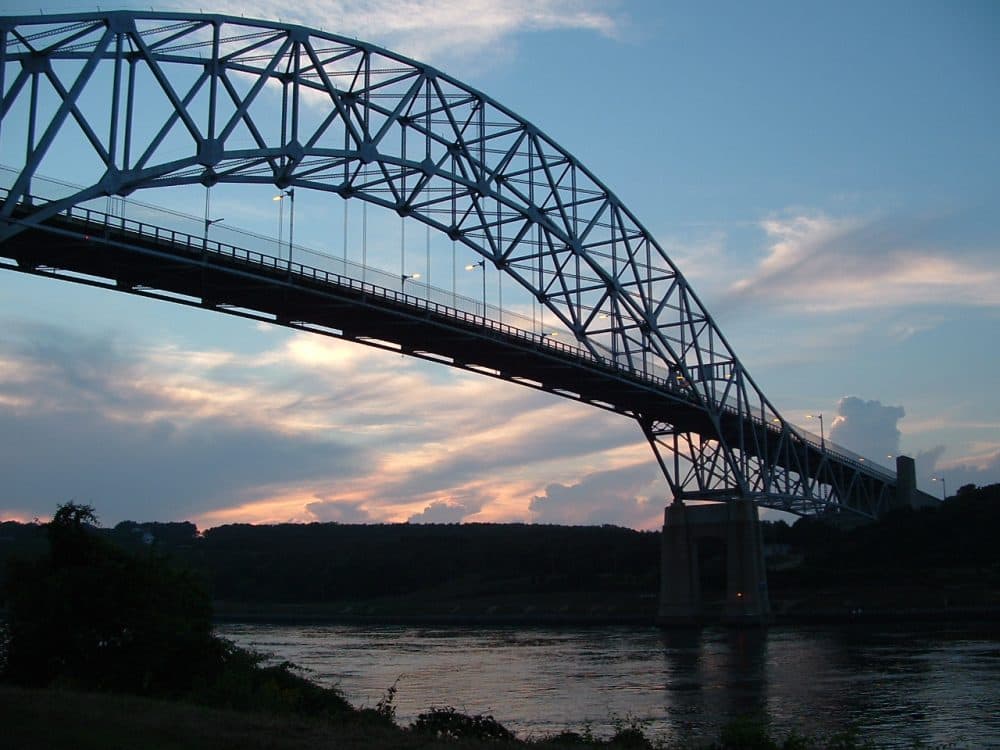Advertisement
Multi-Year Study On Whether To Restore Or Replace Cape Cod Canal Bridges Nears Final Stages

Even when you're not sitting in traffic on Route 6 or Route 25, you can expect to hear a lot about the Cape Cod Canal bridges in 2019, Transportation Secretary Stephanie Pollack said Monday.
The U.S. Army Corps of Engineers, which owns and maintains the Bourne and Sagamore bridges, is studying whether to conduct major overhauls of both, the only two Cape Cod access points for vehicular traffic, by 2025 or whether it would make more sense to build brand new bridges to the Cape.
Pollack made clear Monday that she would rather see the federal government replace both bridges with modern structures that could accommodate more cars, and that she expects 2019 will be a significant year for the possible projects.
The bridges were built between 1933 and 1935, with major rehabilitation conducted in 1981. The Corps of Engineers said the bridges are rated as structurally "fair" but that the structures are "functionally obsolete" because the lanes are too narrow, the bridges have no medians and there is inadequate pedestrian access. Both bridges "require increasingly more frequent maintenance, which is costly and causes significant impact to traffic."
"If you were to ask me, as the governor periodically does, what keeps me up at night, these two bridges would be on my keep-me-up-at-night list," Pollack said. She said the bridges are also major "congestion pinch points ... not just in the summer anymore and not just on the weekends anymore."
The Corps is nearing the final stages of a multi-year study of the Bourne and Sagamore bridges "to determine whether major rehabilitation or replacement of either or both bridges will provide the most reliable, fiscally responsible solution for the future."
The agency is expected to file a draft "major rehabilitation evaluation report" for public comment in mid-2019. That report will include a recommendation for either rehabilitation or replacement, but will not include a proposed design for the replacements.
"They are forecasting that it will need a major rehabilitation project in 2025," state Highway Administrator Jonathan Gulliver said Monday. "The major rehabilitation means that bridges may have lane restrictions or even outright closures at periods for an extended period of time as they undertake a pretty sizeable rehab."
The state Department of Transportation, which owns and maintains the roadways on either side of the bridges, is wrapping up its own planning study to identify future improvements and how the roadways leading to and from the bridges might be realigned if the Army Corps of Engineers opts to construct new bridges.
Advertisement
"Our goal, working with the Corps, is to actually never get to the 2025 major rehabilitation projects, to actually have the replacements in place before then," Pollack said. "Our goal, really working with the Corps and with Federal Highway, is can we accelerate the planning process for replacement of the bridges to the point where it is far enough along that we can avoid the need for the major rehabilitation seven years from now, six years from now, and instead shoot for being in construction on the full replacement."
In a presentation given at various recent public meetings, the Army Corps of Engineers said it is considering three options. The first is a "major rehabilitation," in which major structural components of the existing bridges would be repaired or replaced. This approach would require lane or bridge closures and would have to be done twice in the next 50 years, the Corps said.
The second option is a "replacement as authorized" approach under which two new four-lane bridges would be built next to the existing four-lane bridges using modern Federal Highway standards.
The third option, and the one which Pollack said she prefers, is a "replacement including auxiliary lanes." That approach would involve two new six-lane bridges being built next to the existing four-lane bridges using modern Federal Highway standards. The old bridges would be removed when the new ones open to traffic under both replacement options.
Pollack said Monday that having an additional lane of traffic in each direction on both Cape Cod Canal bridges is "of particular interest" to MassDOT.
"Our position in this process is going to be that replacing the bridges and adding a lane, as well as doing some upgrades to the approaches, is really the right answer for the commonwealth in terms of both addressing the asset condition, modernizing the bridges to meet current standards, but also adding some capacity," Pollack said. "Maybe not enough capacity to prevent every summertime backup, but much more capacity."
Gulliver said the Corps of Engineers plan and recommendation will be subject to a public comment period after they are released, and that the report will lay out the federal agency's next steps in the project. He said funding for the project will require congressional approval.
Pollack said the funding for the Cape Cod Canal bridges project is likely to come in 2020 when two major laws that provide funding to the Corps of Engineers must be reauthorized. She said that having the MassDOT planning study completed ahead of time will make the process go more smoothly.
"If by the end of 2019 we can really get through the permitting process and start the design process and understand what we want to build and what it will cost, we will be much better positioned to engage," she said. "These are not state assets, we are not volunteering to pay for them. But since they are the only connection between the mainland of the commonwealth and the Cape, we obviously have a strong interest in making sure this gets done right."
Pollack stressed that the state will not be paying the cost of replacing or significantly rehabilitating the bridges, but she said she expects the cost will stretch into the billions.
"I think that a B is probably a more appropriate letter than an M," she said.